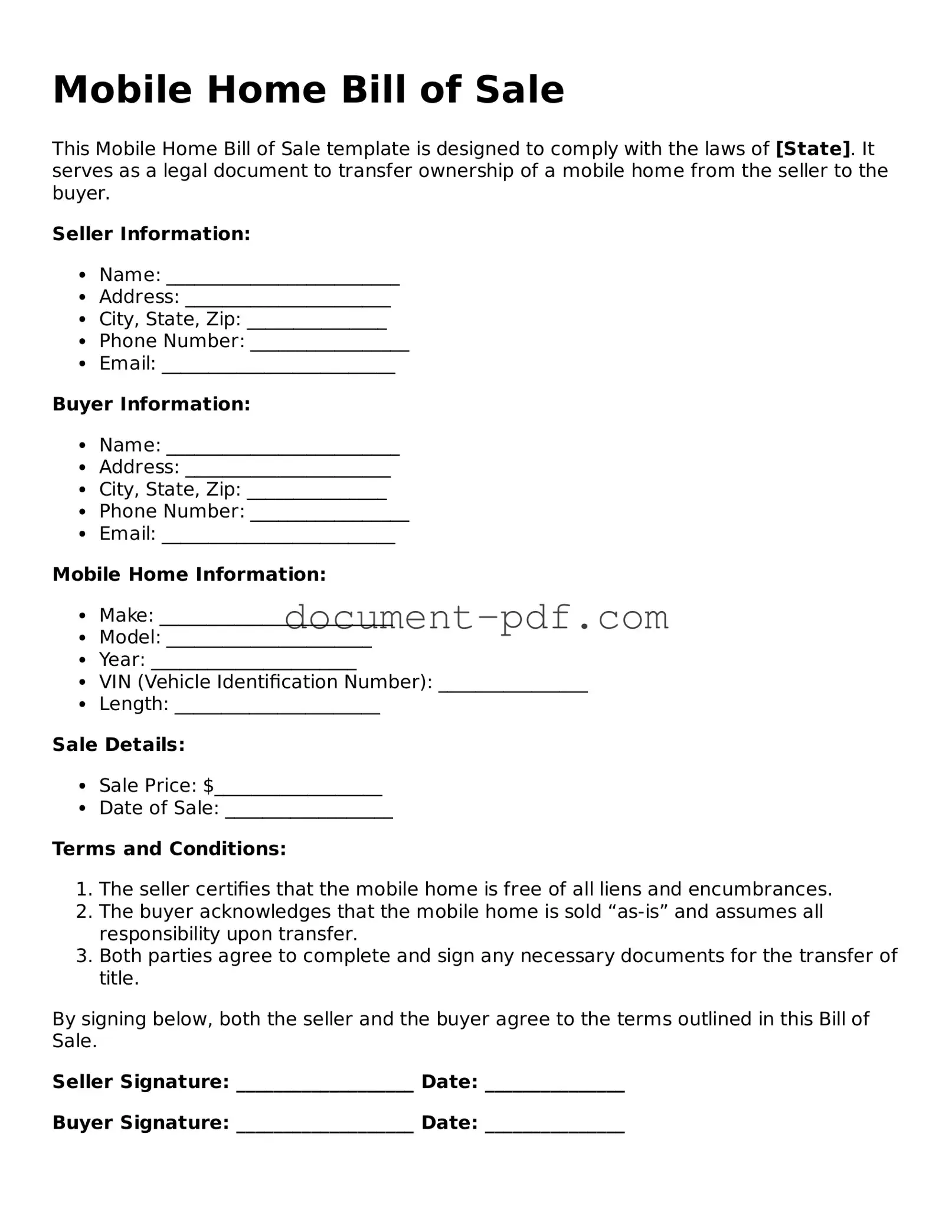The Mobile Home Bill of Sale form shares similarities with the Vehicle Bill of Sale. Both documents serve as proof of ownership transfer. When someone sells a car, the seller provides a Vehicle Bill of Sale to the buyer. This document includes details about the vehicle, such as its make, model, and VIN. Similarly, the Mobile Home Bill of Sale includes information about the mobile home, like its make, model, and serial number. Both forms protect the rights of both parties involved in the transaction.
Another document akin to the Mobile Home Bill of Sale is the Boat Bill of Sale. Just as with mobile homes and vehicles, boats require a formal transfer of ownership. The Boat Bill of Sale outlines the specifics of the boat, including its registration number and hull identification number. This document ensures that the buyer has clear ownership rights, much like the Mobile Home Bill of Sale does for mobile homes.
The Real Estate Purchase Agreement also bears similarities to the Mobile Home Bill of Sale. While the former is typically used for traditional homes, both documents detail the terms of a sale. They include information about the property, the sale price, and the parties involved. Both agreements serve to protect the interests of the buyer and seller, ensuring that the transaction is legally binding.
A Rental Agreement is another document that resembles the Mobile Home Bill of Sale. While the Rental Agreement is used for leasing property, it still involves the transfer of rights to use a dwelling. Both documents specify the terms under which a party can occupy a space. In the case of a mobile home, the Bill of Sale confirms ownership, while a Rental Agreement outlines the terms for renting a mobile home.
The Lease Agreement is similar in function to the Mobile Home Bill of Sale, particularly when the mobile home is being leased rather than sold. A Lease Agreement details the terms of the lease, including duration, rent amount, and responsibilities of both parties. While the Bill of Sale signifies ownership transfer, the Lease Agreement focuses on the temporary use of the property.
The Warranty Deed is another document that shares characteristics with the Mobile Home Bill of Sale. Both documents facilitate the transfer of property ownership. A Warranty Deed provides a guarantee that the seller holds clear title to the property and has the right to sell it. Similarly, the Mobile Home Bill of Sale confirms that the seller has the authority to sell the mobile home, ensuring the buyer receives a legitimate title.
The Affidavit of Title is similar to the Mobile Home Bill of Sale in that it serves to confirm ownership. This document is often used when the seller cannot provide a physical title for the property. The Affidavit of Title asserts that the seller is the rightful owner and has the right to sell the property. This parallels the Mobile Home Bill of Sale, which also affirms the seller's ownership during the sale process.
The Power of Attorney can also be compared to the Mobile Home Bill of Sale. While the former grants someone the authority to act on behalf of another person, both documents involve the transfer of rights. If a seller cannot be present for the sale of their mobile home, they might use a Power of Attorney to authorize someone else to complete the transaction. This ensures that the sale can proceed smoothly, similar to how the Bill of Sale finalizes the transfer of ownership.
The Purchase Agreement for Personal Property is another document similar to the Mobile Home Bill of Sale. This agreement outlines the terms of sale for various personal items, including mobile homes. It typically includes the description of the item, the purchase price, and the parties involved. Like the Mobile Home Bill of Sale, it serves to protect both the buyer and seller during the transaction.
The completion of necessary documentation is crucial across various transactions, including the Mobile Home Bill of Sale, and similarly, the USCIS I-9 form is essential for employers to verify the eligibility of their employees, ensuring compliant practices in employment verification processes.
Lastly, the Assignment of Lease is comparable to the Mobile Home Bill of Sale, especially in situations where a mobile home is leased. This document allows one party to transfer their lease rights to another. While the Mobile Home Bill of Sale transfers ownership, the Assignment of Lease transfers the right to occupy the mobile home. Both documents facilitate the movement of rights related to property.

